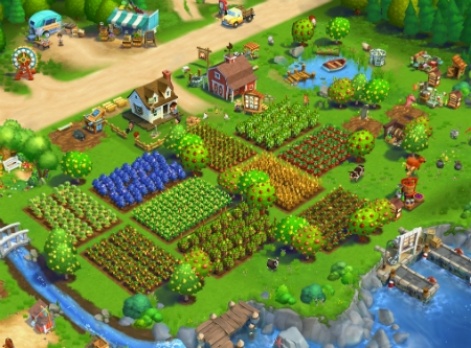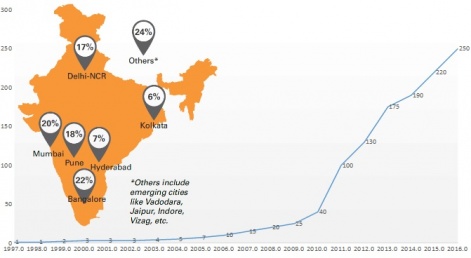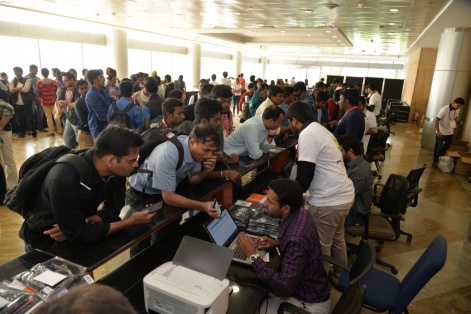India's games industry hasn't been around long.
The first games company in the country was established in 1997, and back then many prospective employees had not even seen a games console before.
20 years on, the scene has matured quickly. India is now home to more than 250 game studios of various sizes, attracting more investment and making more money than ever before.
But in a local industry that's young and still facing considerable challenges, how should someone wanting to get their start in games in India go about it? We put it to our Indian Mavens:
- How did you get your start in game development?
- What tips do you have for those looking to get into the games industry in India?

My name is Rituraj Behera and I am Co-founder of Cympl, an Indie game studio started back in November 2012.
I had begun my career as an application developer but I always loved playing games which attracted me to the fast growing mobile games industry.
I had started the organization with a vision to create high quality mobile games and an attitude to learn & improve everyday.
I always loved playing games since childhood and got really excited about mobile games as well once games like Angry Birds and Temple Run arrived in the scene.
After graduating with Bachelors in Computer Engineering, I also had a keen interest in software design and development.
It was my elder brother who connected the dots and advised me to get into game development, and I said yes the moment I heard the idea.
It has been over four years of struggle trying to get a grip of the industry.Rituraj Behera
This was back in mid-2012 when mobile gaming was exploding in the West but was still very nascent in India. I consider myself very fortunate that I belong to a business family and had the luxury of trying my luck in the business of mobile games.
It has been over four years of struggle trying to get a grip of the industry, finding the right talent, gaining expertise on design and development, finding the right mentor, adopting the appropriate business model, targeting a clear market, etc.
Finally, we can proudly say that we will make some of the best mobile games to come out of this country, with three new releases in June 2017.
But if I could go back in time five years from now and start all over again, below are the few things I would have told myself:
- Perseverence
You must not just love playing but also love the process of designing and developing games. Just enjoying playing games is not enough to survive, let alone do well in the industry.
One has to go through multiple failures, iterations and the long, painful process of making a quality game.
- Target Market
We must be absolutely clear who we want to make the games for. As Mark Skaggs (co-creator of Farmville) famously said in one of his presentations, we need to think like craftsmen and not artistes.

Artisans make things for just themselves, but craftsmen make things for others - a clear target market.
Once we have a target market, all decisions should be based on that: genre, theme, monetisation, distribution strategy, etc.
- Mentor
“Only a fool learns from his own mistakes. The wise man learns from the mistakes of others.” - Otto Von Bismarck.
Mentors are highly experienced in their field of expertise and help us not make the same mistakes they had made or seen in their work experience.
I have personally learned more from mentors than any other formal course could teach me about anything in this field.
- Great people make great games
In this industry, quality matters and not quantity. Having a small but extremely skillful and motivated team is far better than having a bigger team with service mentality.
We need to make sure that we partner with like-minded individuals who are equally passionate about what we do and align with the vision of what we are trying to create.
It was way back in 2003 when I had my first stint in the gaming industry as a graphic artist. Those were the days of pixel art with the limited colours and memory.
It had its own challenges, but was very exciting as it made us part of a vast gaming industry. This domain always remained the fastest-growing over other IT-enabled services.
I touched base with all aspects of game development like technical, graphic, game designing, research and industry analysis.Ashish Gupta
I touched base with all aspects of game development like technical, graphic, game designing, research and industry analysis and actively worked on top notch triple-A projects and branded games.
I was also involved with game design for Japanese markets for BREW/Symbian devices, conceptualising and designing the first Indian superhero game based on some very popular comic characters.
Since those days, there has been a sea change in mobile gaming in India. Once driven by Snake on Nokia phones, the Indian mobile gaming market is reaching new heights thanks to the unprecedented rise of smartphones.
Gamers are mobile users and mobile users are gamers - and gaming is the third most personalised entertainment activity after Facebook and WhatsApp.

The gaming landscape keeps changing rapidly, so always stay abreast about the ongoing developments in the industry:
- It is very helpful to understand all aspects of gaming business and not just stay limited to your job role.
- One should be aware about other functions as well in order to grow in the games industry market in India.
- Start your career with a gaming studio/game publisher, where you can have hands-on expertise on different roles.
- Participate in industry events to learn more about the developments straight from the industry leaders and also to network and grow within the community.
- Lastly, this industry really needs passionate people with an eye for the gaming, sense of UI/UX and most importantly, monetisation to keep the engine running. So give it your best shot!

A few friends and I were looking to play Age of Empires together, at a time when internet cafes were too expensive for the average Indian teenager.
One of us knew a couple of guys who were making games, and more importantly, had a LAN set up with a few rigs.
We arrived at a regular middle-class residence, asking to play Age of Empires, and were told we couldn't play for free - we had to do something for them.
Raptor Entertainment was one of India's earliest game studios.Joel Johnson
They wanted us to brainstorm on potential units for their RTS game. When we returned after a couple of days with our ideas, the two-man team thought it was 'surprisingly good' and asked if we'd like to work with them part-time.
And thus began my tryst with game development, as a 3D modeller for Raptor Entertainment.
Raptor was one of India's earliest game studios, where a team of undergraduates worked day and night to build a proprietary 3D game engine, and games for it.
And we may have played a lot of Counter-Strike 1.6 and Unreal Tournament too.
Today is very different from 15 years ago, as far as connecting and learning is concerned. Facebook and LinkedIn didn't exist then, and Google was in it's early days.
However, the one thing that is consistent from then is that game development is among the few industries where lack of experience isn't an available excuse to enter this domain.
It's quite improbable that you'll get a job (or internship) as a fresh graduate, thinking that you'll 'learn on the job'. Having some games under your belt is the bare necessity to get into a worthy studio.
There are a lot of passionate young people around, and they're all working on their own mini-projects to gain entry into this industry. Get to it.
For those of you wondering how to make a game without someone showing you the ropes, there are at least two ways that I can think of:
- If you're the DIY kind of person - YouTube is a place to get started.
Look for tutorials in the discipline of your choice, and get started. It's going to be very hard, but you'll figure it out. It's doable, and has been done by many before you.
- If you're the kind of person who needs guidance in-person, join the local community for game development.
There are quite a few you can find on Facebook or Meetup.com. If you're fortunate to be in cities like Bangalore, Delhi or Hyderabad, there are offline meetups, some that take place every month.
Just speak to the people who meet up in such forums, and ask for a helping hand. If none of these are options - try reaching out to people via LinkedIn, and ask for guidance.

Bear in mind though, you'll still have to do the hard work - all the guide can do is shine a light in an appropriate direction.
Other than this, we have a few game developer conferences that take place in India each year - get a sense of the energy this community has there, and latch on to a few helping hands, preferably from your city.
The Global Game Jam is conducted in January in a multitude of Indian cities, and is a 48-hour hackathon for game developers. This is a really good opportunity for those of you new to game development to participate in bringing a game to life.
Once you have a few games (of at least passable quality) under your belt, and a few contacts from the industry you've built relationships with at conferences or local meetups, you'll be in a very good position to get into the existing game studios.
And if that's not working out, well, just get together with a few like-minded people and build your own games? Who really needs to get into a games studio anyway?


















